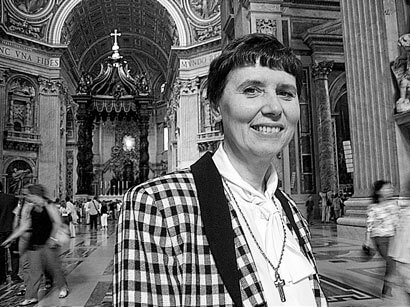Documentary chronicles the extraordinary mission of one nun
to reach out to gays and lesbians
Sister Jeannine Gramick, a Roman Catholic nun, has had a life-long devotion to God. At the age of seven, Gramick sensed that God was calling her to be a nun. By the age of 16, her vocation undeniable, Gramick persuaded her reluctant parents to drive her from her hometown, Philadelphia, to the Baltimore convent of the School Sisters of Notre Dame.
Why, then, would this woman, who has been dedicated to the Catholic Church since she was “knee high to a grasshopper,” as she puts it, undertake a mission that might lead to her excommunication from that community? Gramick’s undertaking—reaching out and ministering to Catholic gays and lesbians—is the focus of Barbara Rick’s film, “In Good Conscience: Sister Jeannine Gramick’s Journey of Faith,” in which the nun patiently explains her conviction that inclusiveness for gays and lesbians is the right thing for the church to do.
Five years ago, Cardinal Joseph Ratzinger, the influential leader of the Congregation for the Doctrine of the Faith, a powerful department within the Vatican with oversight of nearly all matters pertaining to the practice of the Catholic faith, ordered Gramick and Father Robert Nugent to cease their outreach work to gays and lesbians.
“Nugent and Sister Gramick have caused confusion among the Catholic people and have harmed the community of the church… and are permanently prohibited from any pastoral work involving homosexual persons,” read the May 31, 1999 order signed by Ratzinger.
By that time, the two had been ministering to gay and lesbians Catholics since 1977, when they founded New Ways, an outreach ministry that encouraged otherwise reluctant followers of the faith to be active participants in the church.
Nugent complied with the church’s dictate. Gramick, however, continued with her pastoral work and wrote “Building Bridges,” a book that argues that homosexual sex is acceptable in the eyes of God and not contrary to the vows of faith each Catholic makes during the sacrament of confirmation.
Gramick’s book elicited a strong reprimand from the superior of her community, the School Sisters of Notre Dame, to whom Gramick, as do all ordained members of such orders, owes a bond of obedience. In effect, the superior’s order was even more stringent than Ratzinger’s prohibition, in that now Gramick was told not to write or speak on the issue of homosexuality.
Four months later, Gramick spoke at a conference in Philadelphia about the ecclesiastical silencing of those who dissent from some of the church’s social teachings. “It seems as though lesbian and gay people are accepted by higher officials in the church as long as they keep quiet. So I would be accepted if I were silent. But that’s not right. Each one of us needs to speak the truth from our vantage point. Only when all voices are heard, and each person’s truth is laid out, can we arrive at where the spirit is calling us.” Gramick says of this primacy of conscience, “hopefully it is in tune with what the church teaches, but even if it is not, I have the obligation to follow my conscience.”
The conflict of a clergy member’s own moral compass at odds with the official dictates of a Vatican official, marks the juncture of major upheavals in Church history, most notably including the Protestant spilt initiated by Martin Luther.
Within various Protestant congregations, including Episcopals and United Methodists, the issue of inclusiveness for gay and lesbian congregants has in fact threatened those communities with a modern schism.
Nevertheless, after receiving her superior’s warning, Gramick continued her advocacy work, flying to Rome, where the Italian press labeled her “the rebel nun,” and she addressed gay and lesbian groups across the city at book readings. She even dropped off a copy of her book at Ratzinger’s office in St. Peter’s, where she received a less than warm welcome. “I am sure this could draw some ire from the Vatican, but we need to forge ahead…and do things that are liberating for others… We should not be treating others as second-class citizens. Lesbian and gay people have a rightful place in the church, just like everyone else,” said Gramick.
In 2001, Gramick transferred to another order of nuns, the Sisters of Lorettto.
What has pre-empted a more severe censure may well be Gramick’s abundant patience and kindness which is so readily evident on film where she interacts gently with church officials, non-practicing gay and lesbian Catholics, protestors who blame the Church’s sexual abuse scandal on gay priests and even Fred Phelps, a rabid homophobic minister, all without rancor, but rather, an obvious desire to promote understanding. Gramick avoids baiting religious zealots or the exposure promised by opportunistic reporters and opts to press through and tackle how the issue of homosexuality is fracturing the church. Her graciousness extends to her own father, despite the fact that he “thinks gay people are not right.” She credits his lack of tolerance to a lack of knowledge about gays.
“The main purpose of my life is to build bridges of understanding between gay and lesbian people, the hierarchy of the church, and the wider church that is not lesbian or gay,” says Gramick. “We must learn to live together and accept each other. Unless the hierarchy gets to know gay and lesbian people on a human level, one to one… they will have all of these myths and stereotypes. So coming out is important not just to feel proud and good about oneself, but also to help the rest of the church.”
Gramick’s resounding message is for gay and lesbian Catholics to come out and feel free to celebrate their sexuality—within the confines of a loving relationship. Official Catholic catechism condemns homosexual acts as contrary to fostering a healthy relationship with God while stressing the need for tolerance and respect of gay Catholics. Gramick dismisses that apparent contradiction in the church’s “be but don’t do,” stance, comparing it to “saying, ‘OK, you’re a bird, but don’t fly.’”
Gramick has never chosen not to reveal her own sexual orientation, and says in the film that she prefers the emphasis to be on her ministry, not her personal life. When a reporter at the gathering of the Conference of Catholics Bishops in 2002 pressed her, Gramick acknowledges that if she admits she is a lesbian, she will be accused of pushing an agenda, and if she reveals she is heterosexual, the gay community will question if she can relate to the issues.
If her argument seems thin, it is of small consequence considering how much inspiration Gramick has provided for Catholics who wonder why they should be active members of a Church that won’t accept them for who they are. “The church is the people of God,” Gramick says. “I don’t think we should let what some people in Rome say divorce us from a community of faith.”
“Jeannine is the antidote for every priest who has ever been rude to them, for every bishop who ever wrote something nasty,” says a mother from P-FLAG, the national group of family and loved ones of gays and lesbians.
Her new community, the Sisters of Loretto, which historically ministered to frontier woman, seems a good fit for Gramick. Despite the efforts to exclude her from the church, Gramick can still say, without bitterness, “the church of Christ is the church of inclusion.”
In the film, she offers insight into her understanding of what inspires and guides her work. “The most important thing is your relationship with God,” says Gramick, flashing an almost angelic smile.



































